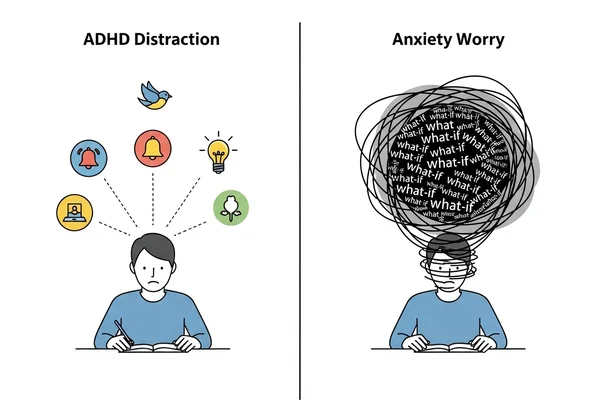ADHD vs. Anxiety: A Guide for Your ADHD Assessment
August 26, 2025 | By Genevieve Hale
Feeling overwhelmed by racing thoughts, restlessness, and an inability to focus? You're not alone, but it can be confusing. Many people find themselves asking, is this ADHD or anxiety? While these conditions share similar traits that can feel tangled and overwhelming, understanding their key differences is the crucial first step toward gaining clarity. This guide will help you untangle the symptoms of ADHD vs anxiety and illuminate a path forward.
If you're looking for a starting point to understand your own patterns, a structured online ADHD assessment can provide valuable insights. It’s a brave and proactive step towards understanding yourself better.
Understanding the Common ADHD and Anxiety Overlap
It's incredibly common to confuse the symptoms of ADHD and anxiety, and for good reason—they often go hand-in-hand. Both can disrupt your daily life, making it hard to manage work, relationships, and personal responsibilities. Before we dive into the differences, it’s helpful to understand why this confusion exists in the first place. The overlap is not just in your head; it’s rooted in shared neurological and psychological challenges.

Why Do These Conditions Feel So Similar?
At their core, both ADHD and anxiety can significantly impact what psychologists call "executive functions." These are the high-level mental skills you use every day to plan, focus, remember instructions, and manage multiple tasks. When these functions are impaired, life can feel chaotic.
For instance, someone with ADHD might struggle to start a project due to difficulties with task initiation, while someone with anxiety might avoid the same project out of a paralyzing fear of failure. The outcome is the same—procrastination—but the root cause is different. This is a classic example of executive function challenges creating similar behaviors for very different reasons.
The Vicious Cycle: How One Can Trigger the Other
ADHD and anxiety can create a challenging feedback loop. Living with the chronic stress of unmanaged ADHD—like missed deadlines, forgotten appointments, and social misunderstandings—can naturally lead to the development of an anxiety disorder. The constant feeling of "not keeping up" can breed persistent worry and fear.
Conversely, the constant mental noise and worry from anxiety can severely impair your ability to focus and concentrate, mimicking the inattentive symptoms of ADHD. This cycle can make it nearly impossible to tell where one condition ends and the other begins without a structured evaluation. Improving your emotional regulation is key to breaking this cycle, but first, you need to identify the primary driver.
A Closer Look at ADHD vs. Anxiety Symptoms
To truly differentiate between the two, we need to look beyond the surface-level behaviors and examine the underlying motivation and feeling behind them. Let's break down three of the most common overlapping symptoms to highlight the key differences in the ADHD vs anxiety symptoms debate.

Trouble Focusing: Is it Distraction or Worry?
One of the biggest areas of confusion is the inability to concentrate. Both conditions can make it feel impossible to stay on task, but the source of the mental disruption is distinct. This is the core of the distraction vs worry dilemma.
- ADHD-related distraction is often external. Your attention is pulled away by things in your environment—a bird outside the window, a new email notification, or a random, unrelated thought that pops into your head. The mind jumps from one interesting stimulus to the next, making it difficult to sustain focus on a single, less stimulating task.
- Anxiety-related distraction, on the other hand, is usually internal. Your focus is consumed by persistent worries, fears, or "what-if" scenarios. You're not necessarily drawn to something new; you're trapped by a looping thought pattern that makes it impossible to concentrate on the present moment.
Restlessness: Is it Physical or Mental?
That feeling of being unable to sit still is another common thread. However, the nature of this restlessness provides important clues. The difference between physical vs mental restlessness is a key indicator.
- ADHD-related restlessness is often physical and hyperactive. It manifests as a compelling need to move. This can look like fidgeting, tapping your feet, squirming in your seat, or feeling an internal "engine" that won't shut off. The movement is often a way to release excess energy and even helps some individuals with ADHD to focus better.
- Anxiety-related restlessness is typically more of an internal, mental state. It's a feeling of being on edge, tense, or filled with a sense of impending dread. While it can lead to physical manifestations like trembling or pacing, the root cause is a mind that cannot relax due to overwhelming worry.
Procrastination: Is it Avoidance or Overwhelm?
Putting things off is a hallmark of both conditions, but understanding the procrastination causes can help you distinguish between them.
- ADHD-driven procrastination often stems from executive function deficits. A task might feel too boring, too overwhelming, or you may simply not know where to begin. The brain struggles to activate and initiate the task, especially if there isn't an immediate reward or consequence. It's less about fear and more about a mental roadblock to getting started.
- Anxiety-driven procrastination is rooted in avoidance and fear. You might delay a task because you're afraid of failing, being judged, or not doing it perfectly. The anxiety surrounding the outcome becomes so intense that avoiding the task feels safer than facing the potential for negative results.
Can You Have Both ADHD and Anxiety?
After reading the comparisons, you might be thinking, "I experience both of these things!" That is a very common and valid realization. The answer to can you have both ADHD and anxiety is a definitive yes. In fact, it's incredibly common.
Understanding Comorbidity in Mental Health
In the world of psychology, when two or more conditions exist in the same person at the same time, it is called comorbidity. Research shows that a significant percentage of adults with ADHD also have a co-occurring anxiety disorder. The two conditions can interact and often worsen each other's symptoms, making daily life even more challenging.
Because of this high rate of comorbidity, trying to self-diagnose can be like trying to untangle a knot in the dark. You can feel the problem, but it's hard to see the individual strands. This is why getting a clear picture of your primary challenges is so important. A good first step is often an adult adhd assessment designed to screen for specific traits.
Why a Professional Assessment is Crucial
Due to the complex overlap and high potential for comorbidity, a professional ADHD assessment is essential for an accurate diagnosis and effective treatment plan. A qualified healthcare provider, such as a psychiatrist or psychologist, can conduct a comprehensive evaluation to understand your unique symptom profile.
However, the journey to a formal diagnosis can be long and intimidating. This is where a reliable screening tool becomes invaluable. An initial self-assessment can provide you with structured data and personalized insights about your attention and focus. This information can empower you to have a more productive conversation with a doctor, armed with a report that highlights your specific challenges. Think of it as gathering the evidence before going to court. You can start with a screener right now to take that first step.
From Confusion to Clarity: What's Your Next Step?
Untangling the threads of ADHD and anxiety is a journey of self-discovery. The key differences often lie in the why behind your actions: are you distracted by the world around you or preoccupied by the world within you? Is your restlessness a need to move or a tension you can't escape? Answering these questions is the first step toward clarity and control.

While this guide offers insight, the best way to understand your personal attention patterns is to start with a structured evaluation. Take our free, science-backed online ADHD assessment to get personalized insights that you can share with a healthcare professional. Taking this step isn’t about finding a label; it’s about finding understanding and beginning the path toward a more focused and peaceful life.
Frequently Asked Questions About ADHD and Anxiety
What are the 5 main symptoms of ADHD?
The five core symptom clusters of ADHD recognized by many experts are inattention (trouble focusing, disorganization), hyperactivity (restlessness, fidgeting), impulsivity (acting without thinking), emotional dysregulation (difficulty managing feelings), and executive dysfunction (problems with planning and starting tasks).
Can ADHD develop later in life?
ADHD is a neurodevelopmental disorder, meaning it originates in childhood. However, it is very common for it not to be recognized or diagnosed until adulthood. Life demands like college, a career, or starting a family can make symptoms that were previously manageable become much more apparent. So while it doesn't "develop" in adults, it can certainly be diagnosed later in life.
Is an online assessment a formal ADHD diagnosis?
No, it is very important to understand that an online assessment is not a formal medical diagnosis. It is a screening tool designed to help you identify patterns and traits consistent with ADHD. Our online tool provides a detailed report that serves as an excellent starting point for a conversation with a qualified healthcare professional, who is the only one who can provide a formal diagnosis.
What is the most accurate ADHD test?
There isn't a single test that is considered the "most accurate." The gold standard for an ADHD diagnosis is a comprehensive clinical evaluation by a healthcare professional. This process typically includes detailed interviews, symptom checklists (like the ASRS), and sometimes cognitive testing. A high-quality, science-backed screening tool is a reliable and accurate first step to see if a full evaluation is right for you. Why not get clarity now?
Disclaimer: This article is for informational purposes only and does not constitute medical advice. It is not a substitute for professional medical advice, diagnosis, or treatment. Always seek the advice of your physician or another qualified health provider with any questions you may have regarding a medical condition.